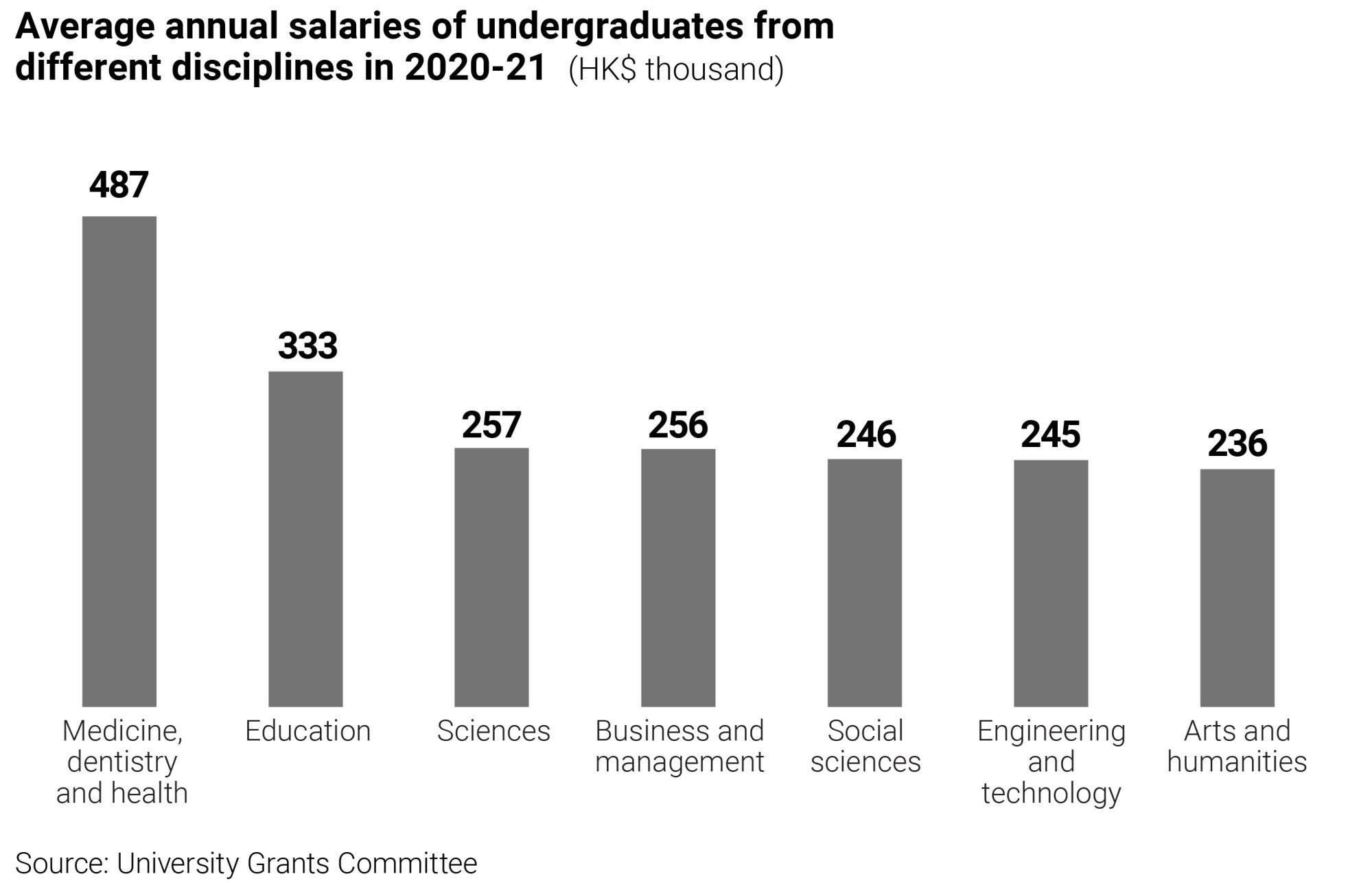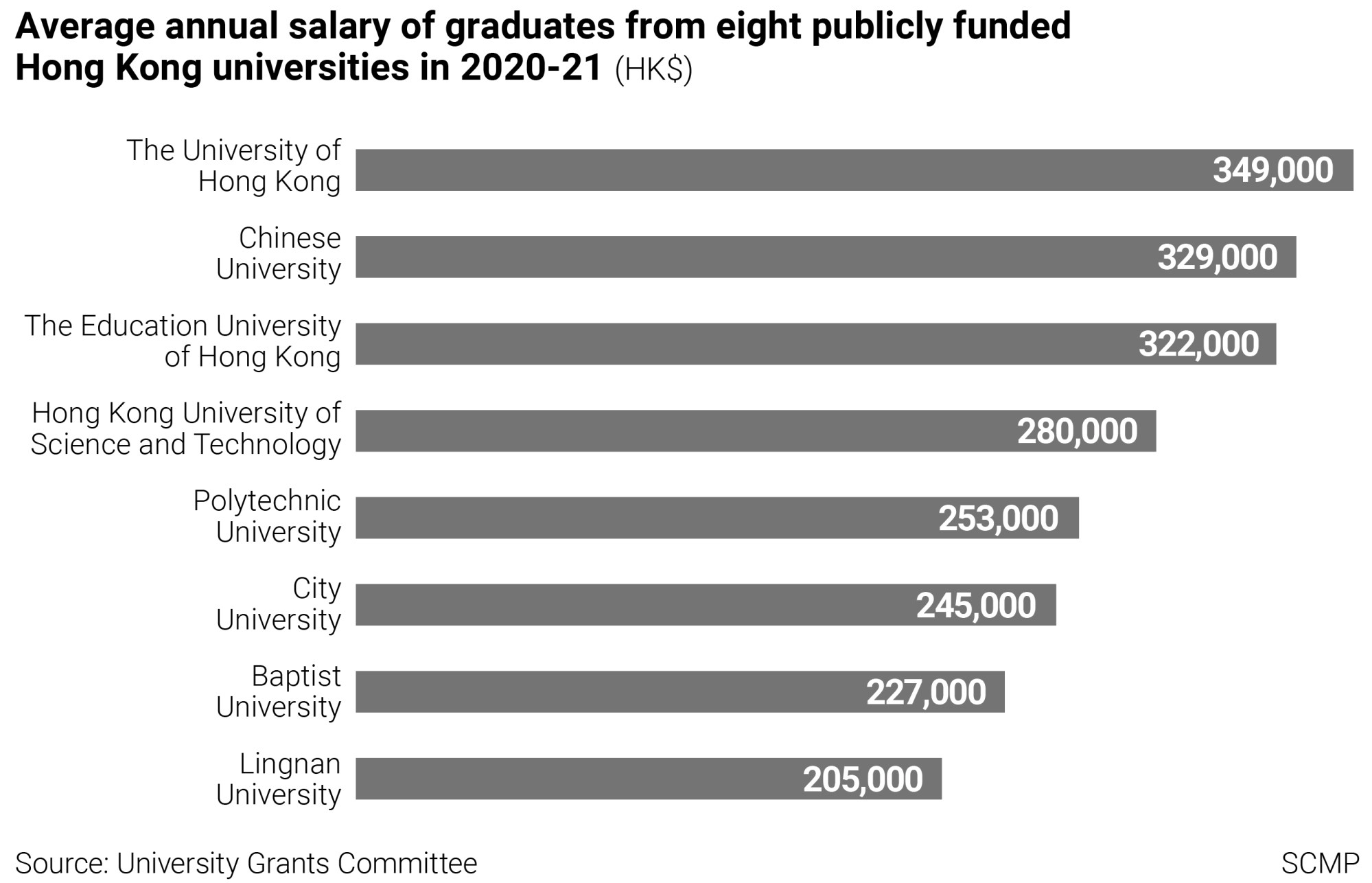
Job market picks up for Hong Kong graduates, with high demand for engineering, technology sub-degree holders
- The average annual salary of fresh graduates rose 6 per cent to HK$281,000 from HK$266,000 in 2020
- Brain drain from city’s tech sector led desperate employers to pay more for sub-degree graduates
The job market for Hong Kong’s fresh graduates improved last year from 2020, with most receiving better pay too, according to the latest data for the city’s eight publicly funded universities.
The graduate unemployment rate improved, but the proportion of jobless graduates from Chinese University (CUHK) was the highest for the second year running.
Those who enjoyed the biggest pay rises were graduates of sub-degree courses in engineering and technology, whose average annual salary rose by nearly a quarter to HK$229,000 (US$29,174) from HK$186,000 in 2020.

The jobs data, released by the University Grants Committee (UGC) which funds the eight universities, showed an improvement across the board following a rare dip in 2020 after the Covid-19 pandemic hit the city.
Together, they produced 22,333 graduates of degree programmes and 2,002 graduates of sub-degree programmes last year.
The graduate employment survey was conducted by the respective universities and covered a total of 19,269 graduates, with a response rate of 88.4 per cent.
Overall, the average annual salary of fresh graduates from the eight universities rose 6 per cent to HK$281,000 from HK$266,000 in 2020.
Business and management graduates fared best, receiving HK$256,000 annually, a 9 per cent jump from the year before and just ahead of science and social sciences graduates who had an 8 per cent rise.

The two groups with the highest starting pay were healthcare professionals and teachers.
On average, healthcare graduates received HK$487,000 a year, a one per cent increase, or HK$5,000 more annually. Education graduates were paid HK$333,000 annually on average, HK$1,000 less than the previous year.
Arts and humanities graduates continued to record the lowest average pay of HK$236,000 annually.
The average salary of postgraduates rose by 5 per cent from the previous year.
The strong performance of the 420 engineering and technology sub-degree graduates helped narrow the overall pay gap between this group and the higher-educated degree holders to HK$52,000 annually.
3 Hong Kong universities rank among top 10 tertiary institutions in Asia
Most sub-degree courses take two years compared to four years for a degree course, and lead to a higher diploma or associate degree. The best sub-degree graduates may continue to Year 2 or 3 of a degree programme.
Graduates of the city’s top two universities, the University of Hong Kong (HKU) and CUHK, secured the highest salary among the eight institutions, earning an average of HK$349,000 and HK$329,000 annually respectively.
They produce most of the city’s medicine and law graduates, whose lucrative packages likely helped pull up the universities’ average salaries.
Behind them were Education University, which produces the bulk of the city’s new teachers each year, and the University of Science and Technology.
Graduates of City University received the biggest jump of around 17 per cent to earn an average of HK$245,000 annually.

Although Lingnan University’s graduates earned the lowest average annual salary of around HK$205,000, they had the second biggest jump of 13 per cent in average annual pay.
The UGC data also showed that the jobless rate of graduates improved to 2.2 per cent last year from 3 per cent in 2020, with 325 out of around 22,000 graduates still unemployed when the survey was done last year.
CUHK had the highest unemployment rate among all eight universities, at 3.6 per cent. It was at the bottom in 2020 too.
But a spokesman for the university said that outcome was because the UGC data did not include graduates who had chosen further studies.
“In fact, 90.95 per cent of CUHK graduates in 2020-21 were engaged in full-time employment or further studies. This is the second-highest percentage among UGC-funded institutions,” he said.

The UGC has used the same method of conducting the survey for many years.
Lingnan University was just behind CUHK, with a jobless rate of 3.4 per cent last year. As in previous years, HKU graduates had the lowest rate.
Commenting on the high demand and top salaries for technology sub-degree holders, Hong Kong Information Technology Federation honorary president Francis Fong Po-kiu said the city’s technology sector, including fintech companies, was developing rapidly but faced a serious shortage of talent.
The emigration waves from Hong Kong since last year had hit the sector and driven up salaries for technology graduates regardless of their academic qualifications, he said.
Universities in Hong Kong ‘facing crisis’ as teaching staff head for exits
Expatriates had also been staying away from Hong Kong because of the city’s stringent quarantine measures.
Some companies anxious to retain talent began allowing programmers to work from other countries, with some setting up their own companies or bureaus elsewhere but continuing in their jobs.
“When staff at higher levels left and vacancies were filled by mid-level staff, all the companies were left scrambling for the fresh graduates, offering high salaries to fill the low-level roles,” he said.

